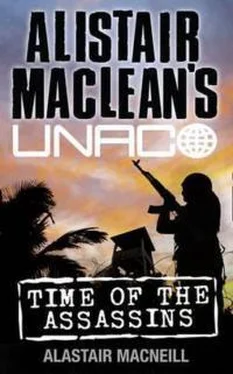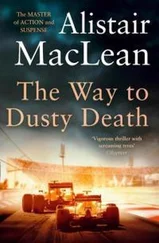‘Couldn’t the garrison be in Chad?’ Sabrina asked.
Tambese shook his head. ‘No, we’ve checked. And anyway, the Chadian government’s too smart for that. If they were giving a safe haven to Ngune’s men it would provide us with the proof we need to discredit them.’
‘That’s it!’ Laidlaw suddenly blurted out. ‘The sewers.’
‘What?’ Sabrina said, turning to Laidlaw in surprise.
‘That’s how we get into the compound – through the sewers. There, that’s the manhole,’ Laidlaw said, pointing it out on the diagram.
‘It’ll be locked,’ Graham said.
‘So we cut through it with an oxyacetylene torch,’ Laidlaw replied.
‘The guards would see the flame from the watchtower,’ Graham shot back.
Laidlaw smiled victoriously. ‘No they wouldn’t. According to the scale of this plan, the manhole cover can’t be more than a couple of yards behind the staff quarters. The guards won’t be able to see it from the watchtowers.’
‘And what about the men in the staff quarters?’ Sabrina asked.
‘If we go in at about three tomorrow morning they’ll be asleep.’ Laidlaw looked at Tambese. ‘You’re sure the only guards on duty then will be the two in the watchtower? There won’t be any guards patrolling the grounds?’
Tambese shook his head. ‘There’s no need. The watchtowers overlook the grounds.’
‘OK, so let’s say we do cut through the manhole cover,’ Graham said, staring at the diagram. ‘How do we get from the staff quarters to the cell block?’
‘The guards will have to be neutralized first. All we’d need for that is a sniper rifle and a silencer.’ Laidlaw looked across at Tambese again. ‘Could you get them?’
‘There’s no need,’ Sabrina said to Tambese. ‘We can use the Uzis you brought from Habane. They’ve got silencers.’
‘It’s too risky,’ Laidlaw replied. ‘Those watchtowers are a good two-hundred yards away from the staff quarters. If we don’t kill the guards with the first bullet, that would almost certainly compromise the operation. That’s why we need a rifle with a telescopic-sight-attachment. It has to be a first-time kill.’
‘I’ll arrange to get them,’ Tambese said.
‘OK, so the guards have been neutralized,’ Graham said. ‘Then what?’
‘Then we cross to the cell block and find Remy Mobuto,’ Laidlaw replied matter-of-factly.
Graham ran his fingers through his hair, a puzzled expression on his face. ‘Surely the two buildings are sectioned off from each other by a fence or a wall?’
‘Not according to this,’ Laidlaw replied, pointing to the two rectangles in the diagram.
‘It isn’t San Quentin, Mr Graham,’ Moredi said softly then sat back and clasped his hands in his lap. ‘There isn’t a canteen where the prisoners can eat their meals. And there isn’t an exercise yard where prisoners can walk about and stretch their legs. There are no rights at Branco. That’s the first thing I learned when I got there.
‘I was held there for eight weeks. And like all political prisoners at Branco, my hands and feet were manacled and I was put in a dark cell, four foot by eight foot, and the only time I ever left it was when I was taken down the corridor to a windowless room where my interrogators were waiting to torture me. And every night a spotlight in the corner of the cell would be switched on and I would be told to stand to attention. That happened almost every hour. And when I was too exhausted to get to my feet any more, one of them would come into the cell and beat me. If I was lucky, he would use a whip or a baton; if not, he used a club studded with sharpened nails or a length of barbed wire. And, of course, I was helpless to defend myself because my hands and feet were in chains. They didn’t even provide a bucket for sanitary purposes, so you lay in your own excrement. Then, once every few days, when the smell became too much even for the guards to endure, they would come round with a hosepipe and spray down the cells.’ Moredi suddenly smiled sadly at Graham. ‘So you see now why there was no need to put up a fence or a wall between the two buildings. We weren’t going anywhere.’
Graham nodded grimly but said nothing. Any words would have been hollow after what Moredi had told them.
‘I can give you a rough layout of the cell block but I won’t go back in there again,’ Moredi said, wringing his hands together, ‘not after what I went through.’
‘We understand,’ Sabrina said gently.
‘Are we going with Mr Laidlaw’s plan then?’ Tambese asked after a lengthy silence.
‘It’s worth a try,’ Graham replied. ‘But we can’t go in there blind. We’ll have to check it out first.’
‘Agreed,’ Laidlaw replied then looked at Tambese again. ‘Can you get a copy of the plans of the sewers for the area around the prison?’
‘Not without arousing suspicion,’ Tambese answered. ‘I only managed to get a plan of Branco because I remembered there was one at our headquarters in Habane. Plans for the sewers will be kept at the city hall, and that’s closed.’
‘We need the plans,’ Laidlaw said, looking at each face in turn. ‘We can’t do anything without them.’
‘Which only leaves one option,’ Graham concluded. ‘Break into the city hall and get them.’
‘We’d never get past the roadblocks,’ Sabrina said.
‘Added to which there’s a curfew in the city from six at night to six in the morning,’ Moredi told them.
‘That only leaves us with one alternative. We’ll have to bring in the resistance movement. I’ll call Matthew Okoye. Excuse me,’ Tambese said then got to his feet and walked to the door.
‘Surely you can contact the resistance movement without involving Okoye?’ Graham called out after him.
‘Not really. He’s their leader,’ Tambese replied then left the room.
Simon Nhlapo scrambled behind the wheel of the ambulance and started the engine as his partner, Joe Vuli, jumped into the passenger seat beside him. He switched on the siren then sped down the driveway and swung the ambulance out into the deserted street. He had been a paramedic for eighteen years at the Kondese National Hospital. Well, that was its new name. It had been the Margaret Mobuto Hospital, named after Alphonse Mobuto’s wife who had died four years after it was opened in 1987. But Jamel Mobuto had ordered the name to be changed within days of his father’s death – just as the Alphonse Mobuto Hospital became the Habane National Hospital.
Nhlapo wasn’t a political man but, like many of the Swahilis in and around Kondese, he saw a future for Zimbala under Jamel Mobuto. That’s why he couldn’t understand why the government had let Ngune and his butchers take control of Kondese. He remembered well the days when Kondese was alive with activity at night. Now the streets were deserted, save for the patrolling gangs of Ngune’s vigilantes who toured the city centre in search of anyone foolish enough to violate the curfew. Punishment was immediate execution. Even the police force had been disbanded by Massenga and now the only vehicles seen on the road after the curfew were those belonging to the besiegers, and they had to have special passes affixed to their windscreens – and, of course, the ambulances.
There had been an initial fear at the hospital that Ngune would install his own puppet doctors but he had assured the administrator that he had no intention of interfering with the running of the hospital, as long as the staff abided by his rules. Many did, out of fear; but others, like Vuli and himself, had joined the resistance movement as soon as the Security Police overran Kondese. It was the first time he had ever been involved in an underground movement. But he felt the time had come to make a stand against the brutality of Ngune and his Security Police. If Ngune seized power the country would again be in the hands of a corrupt dictator. Nothing would have changed. He had to be stopped. But Nhlapo also knew the penalty if he was ever caught as a resistance fighter. That had been spelled out clearly at their first rally. He would be taken to Branco where they would torture then execute him. Dozens had already died at the hands of Ngune’s men since they returned to Kondese. It was as if they had never left. The rumours that the army were preparing to move in to liberate the city had been rife for the last three weeks. But so far, nothing. And the people of Kondese were becoming desperate…
Читать дальше












